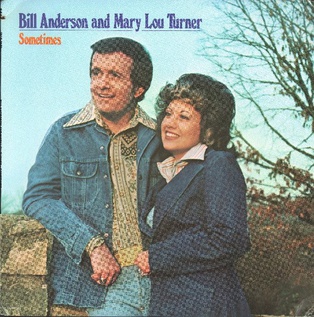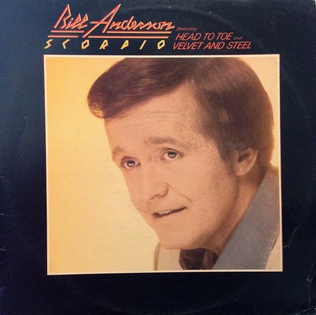Related Research Articles
"Peanuts and Diamonds" is a song written by Bobby Braddock. It was first recorded by American country singer-songwriter Bill Anderson. It was released as a single in 1976 via MCA Records and became a major hit the same year.
"Liars One, Believers Zero" is a song written by Glenn Martin. It was first recorded by American country singer-songwriter Bill Anderson. It was released as a single in 1976 via MCA Records and became a major hit the following year.

Sometimes is a studio album by American country music artists Bill Anderson and Mary Lou Turner. It was released in January 1976 on MCA Records and was produced by Owen Bradley. It was Anderson's twenty fourth studio recording and Turner's first. The album's title track became a major hit on the country charts in both the United States and Canada. The album also reached major positions on the country chart in the United States. Sometimes was the first collaborative project between Anderson and Turner. Anderson hired Turner to work as his duet partner during this period and the project was one of two recordings they made.

Peanuts and Diamonds and Other Jewels is a studio album by American country singer-songwriter Bill Anderson. It was released in September 1976 on MCA Records. It was co-produced by Owen Bradley and Buddy Killen. It was Anderson's twenty fifth studio recording released during his musical career and second to be released in 1976. The album included three singles issued between 1975 and 1976, two of which became major country hits in both the United States and Canada.

Scorpio is a studio album by American country singer-songwriter Bill Anderson. It was released in April 1977 on MCA Records and was produced by Buddy Killen. Scorpio was Anderson's 26th studio album as a recording artist and first album release of 1977. Another album would follow later in the year. The project produced two singles that became major hits.

Billy Boy & Mary Lou is a studio album by American country music artists Bill Anderson and Mary Lou Turner. It was released in June 1977 on MCA Records and was produced by Buddy Killen. It was the duo's second studio album together since pairing up as a duet team in the mid 1970s. The album produced two singles between 1977 and 1978. It would be the duo's final studio album together.

Love...& Other Sad Stories is a studio album by American country singer-songwriter Bill Anderson. It was released in 1978 on MCA Records and was produced by Buddy Killen. The album was Anderson's 28th studio recording in his career and was among his final MCA albums. The record included the song, "I Can't Wait Any Longer". Issued as a single, it became a major country hit and minor crossover hit in 1978. It was Anderson's biggest hit single in several years and relaunched his career as a country pop vocalist. The album itself would also receive reception from writers and would chart in music publications.

Ladies Choice is a studio album by American country singer-songwriter Bill Anderson. It was released in 1979 on MCA Records and was produced by Buddy Killen. His 29th studio album, Ladies Choice, produced two singles that became charting singles on the Billboard country chart. It included a mix of songs composed by Anderson and other songwriters.

Nashville Mirrors is a studio album by American country singer-songwriter Bill Anderson. It was released in 1980 on MCA Records and was produced by Buddy Killen. His 30th studio album, it was also Anderson's final album effort with his long-time record label. The album included three singles that reached minor positions on the Billboard country songs chart.

The singles discography of American country music artist Lynn Anderson contains 72 singles, three promotional singles, one charting B-side, two music videos and nine other song appearances. She signed her first recording contract with Chart Records in 1966. The following year, her single "Ride, Ride, Ride" debuted on the Billboard Hot Country Singles chart. Also in 1967, her single "If I Kiss You " became her first major hit when it reached number five on the country singles chart. Anderson had a series of hits that reached the top ten and 20 during the 1960s including "Promises, Promises" (1969), "No Another Time" (1968), "Big Girls Don't Cry" (1968) and "That's a No No" (1969).
"If You Can Live with It " is a song written and recorded by American country singer-songwriter Bill Anderson. It was released as a single in 1973 via MCA Records and became a major hit the same year.
"Can I Come to You" is a song written by Jerry Crutchfield and Buddy Killen. It was recorded by American country singer-songwriter Bill Anderson. It was released as a single in 1974 via MCA Records and became a major hit the same year.
"I Still Feel the Same About You" is a song written and recorded by American country singer-songwriter Bill Anderson. It was released as a single in 1975 via MCA Records and became a major hit the same year.
"Head to Toe" is a song written by Bobby Braddock. It was first recorded by American country singer-songwriter Bill Anderson. It was released as a single in 1977 via MCA Records and became a major hit the following year.
"This Is a Love Song" is a song written by Jim Weatherly. It was first recorded by American country singer-songwriter Bill Anderson. It was released as a single in 1979 via MCA Records and became a major hit the same year.
"That's What Made Me Love You" is a song written by Lawrence Shoberg. It was first recorded as a duet by American country artists Bill Anderson and Mary Lou Turner. It was released as a single in 1976 via MCA Records and became a major hit the same year.
"Double S" is a song written by Bill Anderson and Buddy Killen. It was first recorded by its co-writer and American country singer-songwriter Bill Anderson. It was released as a single in 1978 via MCA Records and became top 40 hit single.
"The Dream Never Dies" is a song written by Richard Cooper. It was first recorded by his band The Cooper Brothers in 1978 and included on their self-titled Capricorn Records album. It was also released as a single, b/w "Rock and Roll Cowboys". American country singer-songwriter Bill Anderson released it as a single in 1979 via MCA Records and had a top 40 hit single. Juice Newton also recorded the song that same year and released on her Take Heart album.
"Make Mine Night Time" is a song written by Mike Kosser and Curly Putman. It was first recorded by American country singer-songwriter Bill Anderson. It was released as a single in 1980 via MCA Records and became top 40 hit single.

The singles discography of American country singer-songwriter Bill Anderson contains 84 singles, three promotional singles, 6 other charted songs and four music videos. After signing to Decca Records in 1958, Anderson released a series of early singles that became hits, reaching the top ten and 20. This included "That's What It's Like to Be Lonesome" (1958), "The Tip of My Fingers" (1960) and "Po' Folks" (1961). The following year, he reached number one on the Billboard Country and Western Sides chart with "Mama Sang a Song." In 1963, Anderson released his most commercially successful single, "Still." The song was his second number one country single and his first top ten hit on the Billboard Hot 100, climbing to number eight. His follow-up single, "8×10" reached similar crossover success. Anderson released 11 more top ten country hits during the rest of the decade. This included the number one singles "I Get the Fever" (1966) and "My Life " (1969). He also had a number one hit with Jan Howard called "For Loving You" in 1968. Anderson also had top ten hits with "I Love You Drops" (1965), "Happy State of Mind" (1968) and a cover of "But You Know I Love You" (1969).
References
- ↑ Chadbourne, Eugene. "Billy Boy & Mary Lou: Bill Anderson & Mary Lou Turner: Songs, Reviews, Credits". Allmusic . Retrieved 25 July 2020.
- 1 2 Anderson, Bill (1977). "Billy Boy & Mary Lou (Album Information and Liner Notes)". MCA Records .
- 1 2 Whitburn, Joel (2008). Hot Country Songs 1944 to 2008. Record Research, Inc. ISBN 978-0-89820-177-2.
- ↑ ""Where Are You Going, Billy Boy" chart history". Billboard . Retrieved 25 July 2020.
- ↑ "Search results for "Bill Anderson" -- Country Singles". RPM . 17 July 2013. Retrieved 9 April 2020.
- ↑ "Bill Anderson and Mary Lou Turner -- "Where Are You Going, Billy Boy" (1977, Vinyl)". Discogs . 1977. Retrieved 25 July 2020.
- ↑ "Bill Anderson Chart History (Hot Country Songs)". Billboard. Retrieved July 25, 2020.